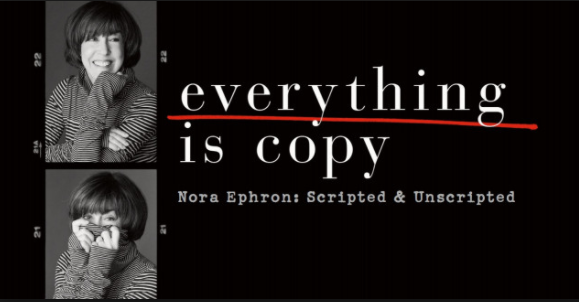The family mantra of the Ephrons, started by Nora’s screenwriter mother, Phoebe Wolkind, was simply this: “everything is copy.” That is to say, any pains and agonies from one’s life are to be turned into a positive by reconstructing the narrative into art–particularly scathing and humorous art. By doing so, you achieve that rare human feat, self-preservation through the tormenting of those who have wronged you. Though Ephron began in journalism–part of the many women who played under glorified “office wives” posing as research assistants that were actually doing most of the writing–she wasn’t ever one for playing the shill. As Ephron’s character, portrayed by, fittingly, Meryl Streep’s daughter, Grace Gummer, states in the likely not to return Good Girls Revolt, “You guys are fighting about the lower bunk bed in jail.” And Ephron always wanted the top, a place she rose to quickly after quitting Newsweek, joining in the ACLU class action lawsuit against them and parodying the New York Post in a satire publication called the New York Pest. Her witty voice caught the editor of the Post‘s eye and she was soon hired. Five years there led to her regularly appearing columns in Esquire, the subject of which, she broadly told then editor-in-chief, Harold T.P. Hayes, would be about “women.” Emerging as one of the foremost voices of the magazine, Ephron wielded–mostly with acerbicism–her family mantra more freely than ever, even going so far as to take on her very own ex-boss and Post editor, Dorothy Schiff, remarking of her former cash cow (by a journalist’s standards), “It is a terrible newspaper. The reason it is, of course, is Dorothy Schiff.” As part of the New Journalism movement, Ephron stood apart from many of her peers precisely because of how unafraid she was of candor dressed in biting wit.
Ultimately, after marrying famed Watergate reporter Carl Bernstein, Ephron was able to make the leap to books, putting “everything is copy” to the ultimate test with her damning 1983 novel, Heartburn. Through the extraordinary heartache of being cheated on while seven months pregnant with their second child, Ephron’s alter ego, Rachel Samstat, picks up the pieces of her life and copes–occasionally vindictively–with the loss of her husband in the most comically told ways possible. And it all goes back to Phoebe Wolkind’s lingering reminder…which took on new meaning for Ephron after her divorce from Bernstein: “I now believe that what my mother meant was this: When you slip on a banana peel, people laugh at you. But when you tell people you slipped on a banana peel, it’s you’re a laugh, so you become a hero rather than the victim of the joke. I think that’s what she meant. On the other hand, she may merely have meant everything is copy.”
Ultimately, when she had proved herself as a screenwriter with her first non-TV movie, Silkwood (which would establish her longstanding professional relationship and personal rapport with Meryl Streep), Ephron was further permitted to expunge the emotional shock and strain of Bernstein’s betrayal with the film adaptation of Heartburn, which wouldn’t fare quite as successfully as the book. Nonetheless, Ephron, now with children to feed, took the film industry on with an iron fist, lending a sharp feminine voice to beloved romantic comedy classics like When Harry Met Sally, Sleepless in Seattle and Julie & Julia.
As the documentary, guided lovingly by Ephron’s son, Jacob Bernstein, explores, some things, one finds, are not copy. Like Ephron’s death, an occurrence she knew was coming upon being diagnosed with acute myeloid leukemia in 2006. Knowing the end was very palpably in sight, Ephron seemed to become more prolific than ever in her later years, releasing the acclaimed essay collections I Feel Bad About My Neck: And Other Thoughts on Being a Woman and I Remember Nothing: And Other Reflections. Yet, with all the opportunity to discuss frankly her health condition and fear of dying, Ephron told no one what she knew was coming. Because, in the end, the things you truly want to keep for yourself, you keep for yourself–rather than expelling your vitriol onto the page solely for the sake of getting your emotional traumas the fuck out of your body. So yes, everything is copy, but only, in truth, to a certain extent. When the time comes, like Ephron, you’ll know what not to use.






















